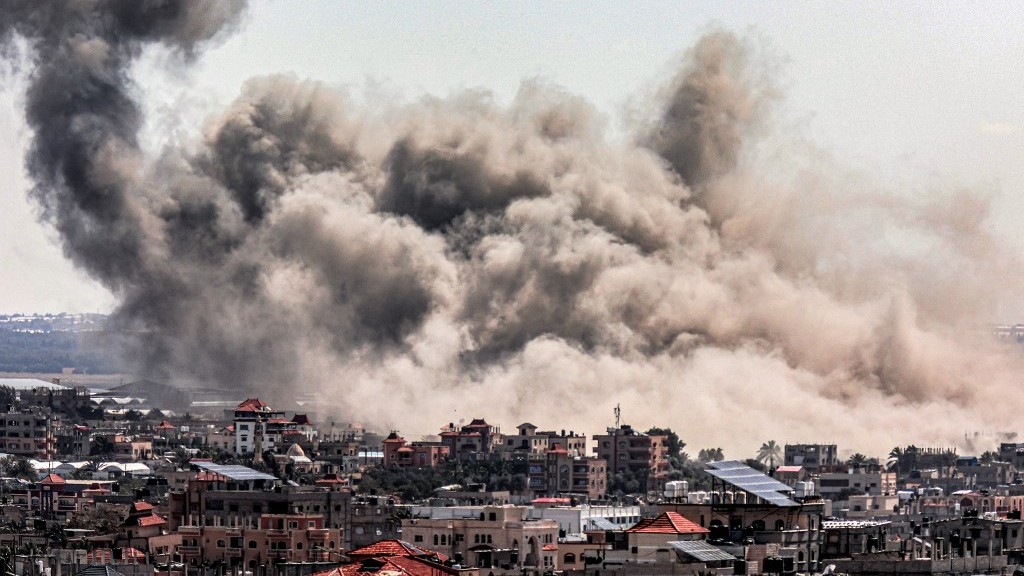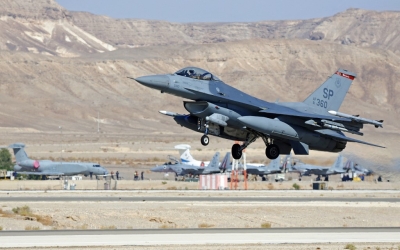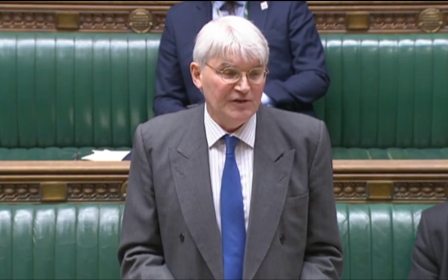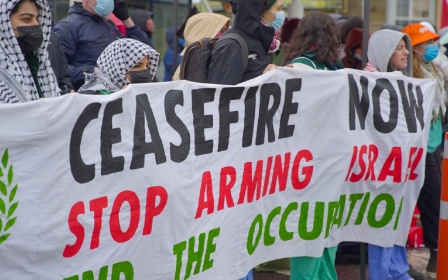UK allowing Israel to 'mark own homework' over war crimes scrutiny, MP says

A prominent MP has raised concerns that the UK government is allowing Israel to “mark their own homework” when it comes to compliance with international humanitarian law in Gaza, Middle East Eye can report.
In a letter sent to Foreign Office minister Andrew Mitchell on Wednesday, and seen exclusively by MEE, Brendan O'Hara MP questioned which organisations and charities have been providing evidence to the government regarding Israel's legal compliance.
In particular, O'Hara, the Scottish National Party's spokesperson on foreign affairs, said he was concerned that the UK "takes confidence in Israel's compliance with IHL [international humanitarian law] based on the mere presence of lawyers embedded with the Israel Defence Forces.
"While internal legal scrutiny within military operations is acknowledged as important… it is essential that compliance with [international humanitarian law] is scrutinised by an accepted and impartial international body such as the UN or the ICC," he wrote.
New MEE newsletter: Jerusalem Dispatch
Sign up to get the latest insights and analysis on Israel-Palestine, alongside Turkey Unpacked and other MEE newsletters
"Allowing any conflict to the party to 'mark their own homework' risks compromising impartiality and raises significant questions about the objectivity and credibility of assessments especially when there is mounting evidence of violations."
Mounting questions
O'Hara's letter follows a two-hour parliamentary debate on Gaza on Tuesday, in which nearly a dozen MPs called on the government to say whether it has updated its assessment of Israel’s compliance, given that a UN-backed report this week found Gaza to be in a state of imminent famine.
Mitchell would not be drawn to share details, but said that the Foreign Office was "going through the necessary legal processes, which are complex" and would update MPs as soon as it was in a position to do so.
'This raises critical questions about the UK's reliance on assessments made by lawyers within the IDF, given the inherent conflict of interest and potential bias'
– Brendan O'Hara, SNP
During the debate, Mitchell said the UK government's legal assessments were supported by "a detailed evidence base, conflict analysis, reporting from charities, non-governmental organisations, international bodies and partner countries, statements and reports by the Israeli government, and their track record of compliance".
Mitchell then added that the Israeli military has its own lawyers embedded in units involved in targeting and military action, "in much the same way of prudence that the British military do.
"That is not something we see in any other force in the region and it should give some confidence that the Israelis are seeking to abide by international humanitarian law," he said.
In his letter, O'Hara asks Mitchell to identify which NGOs were providing information to the government, "especially when there are many reports that have found Israel has committed serious violations of [international humanitarian law] including war crimes.

"This raises critical questions about the UK's reliance on assessments made by lawyers within the IDF, given the inherent conflict of interest and potential bias, alongside Israel's own poor record when it comes to investigating itself," he wrote.
MEE has asked the Foreign Office for comment.
Yasmine Ahmed, UK director of Human Rights Watch, said the government could not "stand behind the general claim that Israel complies with international law when the evidence to the contrary is mounting by the day".
The foreign office’s assessment of Israel’s compliance with international humanitarian law is critical for UK arms exports to the country. The government is obligated to suspend export licences if it determines there is a clear risk that British weapons could be used in serious violations of international humanitarian law.
"By failing to suspend the licensing of military equipment to Israel, the UK government at risk of failing to prevent genocide, and being complicit in serious violations of international law, including war crimes and crimes against humanity as well as breaking UK law," Ahmed said.
In addition to the unfolding famine in Gaza, concerns over Israel's compliance with international humanitarian law come a week after two aid organisations said Israeli officials gave them six different explanations about why the residential compound housing their staff in Gaza was attacked in January.
The compound housing British doctors working for the UK-based Medical Aid for Palestine and US-based International Rescue Committee had been marked by the Israelis a month earlier as a protected, humanitarian area.
Mitchell said on Tuesday that the attack was "appalling" and required "a full and transparent inquiry and examination into how those events took place".
Middle East Eye delivers independent and unrivalled coverage and analysis of the Middle East, North Africa and beyond. To learn more about republishing this content and the associated fees, please fill out this form. More about MEE can be found here.




